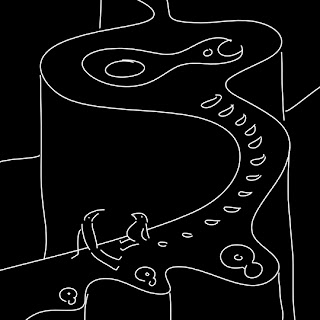schiller \ˈshi-lər\ noun: a common name for adularescence
Etymology: German
Many geologic terms stem from German.
Wednesday, March 31, 2010
Tuesday, March 30, 2010
Adularescence
adularescence \ə-ˌdü -lə-ˈre-sən(t)s\ noun: an optical phenomenon in certain gems in which a milky luster or glow seems to originate below the surface of the stone and appears to move as the stone is turned, giving the impression of moonlight on water
Etymology: From aldularia, a mineral from the Aldula Mountains of Switzerland
Moonstone, so named for its moonlight-on-water optical property, is composed of aldularia crystal.
Etymology: From aldularia, a mineral from the Aldula Mountains of Switzerland
Moonstone, so named for its moonlight-on-water optical property, is composed of aldularia crystal.
Monday, March 29, 2010
Aventurescence
aventurescence \ə-ˌven-chər-ˈe-sən(t)s\ noun: an optical reflectance effect in certain gems in which a metallic glitter arises from minute mineral platelets within the material
Etymology: Italian a ventura by chance (referring to the chance discovery of aventurine glass in the 18th century)
Have you seen Michelangelo Antonioni’s L’avventura, by any chance? It is not about aventurescence.
Etymology: Italian a ventura by chance (referring to the chance discovery of aventurine glass in the 18th century)
Have you seen Michelangelo Antonioni’s L’avventura, by any chance? It is not about aventurescence.
Sunday, March 28, 2010
Fugacious
fugacious \fyü-ˈgā-shəs\ adjective: lasting a short time; evanescent
Etymology: Latin fugac-, fugax, from fugere
“How is it that I struck Echt to rouse him from his slumber, but it is I who awoke?”
Saturday, March 27, 2010
Ersatz
ersatz \ˈer-ˌsäts\ adjective: being a usually artificial and inferior substitute or imitation {ersatz turf} {ersatz intellectuals}
Etymology: German Ersatz substitute
“That didn’t work, Echt; I’m still asleep.” “Well, Ersatz, try slapping me in the face to see if I can wake up.”
Friday, March 26, 2010
Echt
echt \ˈekht\ adjective: true, genuine {an echt New Yorker}
Etymology: German echt, Yiddish ekht
“Hey, Echt, I’ve got an idea. Shake me hard enough that I wake up from this dream.” “Sure thing, Ersatz. The old ‘shake & wake.’”
Thursday, March 25, 2010
Pugnacious
pugnacious \ˌpəg-ˈnā-shəs\ adjective: having a quarrelsome or combative nature; truculent
Etymology: Latin pugnac-, pugnax, from pugnare to fight
“And now it’s twilight. How did it get dark so quickly?”
Wednesday, March 24, 2010
Inculcate
inculcate \ˈin-(ˌ)kəl-ˌkāt\ transitive verb: to teach and impress by frequent repetitions or admonitions
Etymology: Latin inculcatus, past participle of inculcare, literally, to tread on, from in- + calcare to trample, from calc-, calx heel
“Where are we? This doesn’t make sense. I thought I was dreaming, but now we’re here.”
Tuesday, March 23, 2010
Revetment
revetment \ˈri-ˈvet-mənt\ noun: 1 : a facing (as of stone or concrete) to sustain an embankment, 2. embankment, especially a barricade to provide shelter (as against bomb fragments or strafing)
Etymology: French revetement
The river rivets the revetment. The rivulet ambles beside.
Monday, March 22, 2010
Froufrou
froufrou \ˈfrü-(ˌ)frü\ noun: 1. a rustling, especially of a woman’s skirts, 2. showy or frilly ornamentation
Etymology: French, of imitative origin
“Of imitative origin?” Rustling skirts don’t say “froufrou;” they whisper “whoosk-whoosk.”
Sunday, March 21, 2010
Concrescence
concrescence \kən-ˈkre-sən(t)s\ noun: 1. increase by the addition of particles, 2. a growing together; coalescence
Etymology: Latin concrescentia, from concrescere to grow together, from com- + crescere to grow
You read the word coalescence in definition #2 and thought “the essence of coal,” right?
Saturday, March 20, 2010
Concretize
concretize \(ˌ)kän-ˈkrēt-tīz\ transitive verb: to make concrete, specific or definite {tried to concretize his ideas}
Etymology: Middle English, from Latin concretus, from past participle of concrescere thicken, condense
Now that is one useful word.
Friday, March 19, 2010
Chamfer
chamfer \ˈcham(p)-fər\ noun: a beveled edge
transitive verb: 1. to cut a furrow in (as a column), 2. to make a chamfer on
Etymology: back-formation from chamfering, alteration of Middle French chanfreint, from past participle of chanfraindre to bevel, from chant edge (from Latin canthus iron tire) + fraindre to break, from Latin frangere
Thirty white horses on a red hill; first they champ, then they stamp, then they stand still. (But they never chamfer.)
Thursday, March 18, 2010
Lilliputian
Lilliputian \ˌli-lə-ˈpyü-shən\ adjective: 1. small, miniature {a Lilliputian camera}, 2. petty
Etymology: Lilliput, imaginary land of small people in Gulliver’s Travels, by Jonathan Swift
As miniature is to Lilliputian, so majuscule is to Brobdingnagian.
Wednesday, March 17, 2010
Brobdingnagian
Brobdingnagian \ˌbräb-diŋ-ˈna-gē-ən\ adjective: marked by tremendous size
Etymology: Brobdingnag, imaginary land of giants in Gulliver’s Travels, by Jonathan Swift
Most know Swift’s other contribution to the lexicon of size.
Tuesday, March 16, 2010
Epaulet
epaulet \ˌe-pə-ˈlet\ noun: something that ornaments or protects the shoulder, as an ornamental fringed shoulder pad formerly worn as part of a military uniform or an ornamental strip or loop sewn across the shoulder of a dress or coat
Etymology: French épaulette, diminutive of épaule shoulder, from Old French espalle, from Late Latin spatula shoulder blade, spoon, diminutive of Latin spatha spoon, sword
The golden scrub brush!
Monday, March 15, 2010
Testator
testator \ˈtes-ˌtā-tər\ noun: a person who dies leaving a will or testament in force
Etymology: Middle English testatour, from Anglo-French, from Late Latin testator, from Latin testari, from testis testicle, witness
The Romans had one word for testicle and witness? Huh?
Sunday, March 14, 2010
Alacrity
alacrity \ə-ˈla-krə-tē\ noun: promptness in response; cheerful readiness {accepted the invitation with alacrity}
Etymology: Latin alacritas, from alacr-, alacer lively, eager
Alacrity makes me think of acid, which makes me think of a sour disposition, which is the opposite of alacrity.
Saturday, March 13, 2010
Rubenesque
Rubenesque \ˌrü-bə-ˈnesk\ adjective: of, relating to, or suggestive of the painter Rubens or his works; especially: plump or rounded usually in a pleasing or attractive way {a Rubenesque figure}
Etymology: from Peter Paul Rubens (Flemish, 1577-1640)
No one would accuse the Loam King of being Rubenesque.
Friday, March 12, 2010
Gloam
gloam \ˈglōm\ noun: twilight
Etymology: Scots gloam to become twilight, back-formation from gloaming
The Loam King has a head of clay, a heart of silt and guts of sand.
Thursday, March 11, 2010
Friable
friable \ˈfrī-ə-bəl\ adjective: easily crumbled or pulverized
Etymology: Middle French, from Latin friabilis, from friare to crumble
Beware the friable eyes of the Loam King!
Wednesday, March 10, 2010
Loam
loam \ˈlōm\ noun: a soil composed of a friable mixture of roughly equal amounts of clay, silt and sand
Etymology: Middle English lom, from Old English lām clay, mud
Beware the Loam King!
Tuesday, March 9, 2010
Doyen
doyen \ˈdoi-ən\ noun: 1 a. the senior member of a body or group, b. a person considered to be knowledgeable or uniquely skilled as a result of long experience in some field of endeavor, 2. the oldest example of a category
doyenne \doi-ˈ(y)en\ noun: a woman who is a doyen
Etymology: French, from Old French deien, from Late Latin decanus chief of ten, from Greek dekanos, from deka ten
Am I remembering correctly that these words appear often in art history literture to describe influential collectors or heads of art movements?
Monday, March 8, 2010
Conurbation
conurbation \ˌkä-(ˌ)nər-ˈbā-shən\ noun: an aggregation or continuous network of urban communities
Etymology: com- together + Latin urb- city
Those with a ribald sense of wordplay may note a similarity between today’s entry and another word signifying the subject of The Who’s “Pictures of Lily.”
Sunday, March 7, 2010
Sapience
sapience \ˈsā-pē-ən(t)s\ noun: wisdom, sagacity
Etymology: Middle English, from Anglo-French, from Latin sapientia, from sapere, to know
Homo sapiens are literally “wise humans.”
Saturday, March 6, 2010
Sangfroid
sangfroid \ˈsäⁿ-ˈf(r)wä\ noun: self-possession or imperturbability especially under strain
Etymology: French sang-froid (literally) cold blood
Quite a different sense than the phrase “in cold blood.”
Friday, March 5, 2010
Glottogony
glottogony \glə-ˈtä-gə-nē\ noun: 1. the genesis of language (i. e. the emergence of a system of verbal communication from proto-linguistic or non-linguistic means of communication), 2. the study of language origins
Etymology: Greek glotto- tongue, language + -gony genesis, origination
A big thanks goes out to my friend Bernadette for introducing me to this word.
Thursday, March 4, 2010
Skep
skep \ˈskep\ noun: hive (especially a domed hive made of twisted straw)
Etymology: Middle English skeppe basket, beehive, from Old English sceppe basket, from Old Norse skeppa bushel
Skep, hive, apiary… Can you think of any more synonyms?
Wednesday, March 3, 2010
Zounds
zounds \ˈzown(d)z\ interjection: an exclamation used as a mild oath to express anger, surprise, assertion, etc.
Etymology: euphemism for God’s wounds, a reference to Christ’s wounds before the crucifixion
Merriam-Webster refers to an interjection as a special kind of “ejaculatory utterance.”
Tuesday, March 2, 2010
Plenitude
plenitude \ˈple-nə-ˌtüd\ noun: 1. the quality or state of being full; completeness, 2. a great sufficiency; abundance
Etymology: Middle English, from Anglo-French, from Latin plenitudo, from plenus full
So there you have it — plenitude does not mean “plentiful attitude.”
Monday, March 1, 2010
Echolalia
echolalia \ˌe-kō-ˈlā-lē-ə\ noun: the often pathological repetition of what is said by other people as if echoing them
Etymology: New Latin
It must be really annoying to live with someone afflicted with echolalia.
Subscribe to:
Posts (Atom)


































